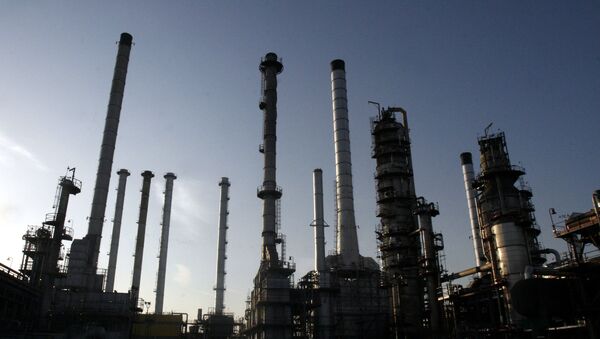The European Union and other Iranian oil clients have reacted to US president Donald Trump’s reimposition of sanctions last Monday by finding ways to mitigate their secondary effects on international oil markets.
Several EU foreign ministers along with High Representative Frederica Mogherini have issued a joint statement on Monday condemning American sanctions and expressing their commitment to upholding the 2015 Joint Comprehensive Plan of Action (JCPOA), also known as the “Iran deal”.
“The remaining parties to the JCPOA have committed to work on, inter alia, the preservation and maintenance of effective financial channels with Iran, and the continuation of Iran's export of oil and gas, [including] with third countries interested in supporting the JCPOA and maintaining economic relations with Iran. These efforts will be intensified and reviewed at Ministerial level in the coming weeks,” the statement said.
The EU also plans to implement a blocking statute in order to retain access to Iranian oil markets, which it needs to diversify its own energy consumption needs by barring European companies from complying with US sanctions.
Many analysts have speculated that motions like these are essential to stabilising oil prices, as any major disruptions emanating from US foreign policy will push them up to $90 and beyond.
"As we go more towards the fourth quarter, that's when we really see the risk of prices going well into the 80s and potentially even into the 90s but very critical is how much Iranian production we lose,” Energy Aspects chief oil analyst Amrita Sen said as quoted by CNBC.
Following its May 8 withdrawal from the JCPOA, the Trump administration has tried to limit Iran’s access to oil and gas markets by limiting its productive capacity, with minimal success.
However, to make up for the inevitable shortfalls in oil production, Trump began to publicly rely on on Gulf heavyweight Saudi Arabia to increase production, which has proved difficult thus far.
Trump tweeted June 30 that he had spoken to Saudi king Mohammad bin Salman to increase oil production to roughly 2 billion barrels per day in order to make up for shortfalls from Iran and Venezuela, also due to US sanctions.
Just spoke to King Salman of Saudi Arabia and explained to him that, because of the turmoil & disfunction in Iran and Venezuela, I am asking that Saudi Arabia increase oil production, maybe up to 2,000,000 barrels, to make up the difference…Prices to high! He has agreed!
— Donald J. Trump (@realDonaldTrump) June 30, 2018
Despite this, Brent crude prices have risen steadily since the start of August, moving from $72.30 to $74.27 per barrel. Prices hovered around $50 at the start of 2018 and have risen dramatically.
Some analysts have berated the president for his wishful thinking. “You cannot order 2 million barrels like ordering a coffee somewhere,” Porta Advisors partner Beat Wittman told the media.
When asked about how the US plans to negotiate the “sunset” period of the JCPoA, Director of Policy Planning Brian Hook told reporters March 21:
“We – where we have agreement, we are capturing the agreement, and where we have differences, we are working to narrow them to see if we can reach an agreement. [We] have had very constructive meetings and we are (inaudible) toward reaching an agreement, and we’ll see.”
Iranian foreign minister Javad Zarif tweeted, “[The] Trump Administration wants the world to believe it's concerned about the Iranian people. Yet the very first sanctions it reimposed have canceled licenses for sales of 200+ passenger jets under absurd pretexts, endangering ordinary Iranians. US hypocrisy knows no bounds.”
Despite the looming sanctions, Iran boasted Tuesday that its production capacities far exceeded expectations since the Iranian calendar began March 21st.
“MOGPC CEO Jahangir Pourhang said the company supplied 563,000 barrels per day of oil during the three months which was 101% of its average production,” SHANA news agency reported.
National Iranian South Oil Company (NISOC) CEO Bijan Alipour and MANPA group director Mojtaba Gharavi have also inked several deals to increase partnerships with domestic and foreign companies.
“[Alipour] said NISOC had signed 18 memoranda of understanding (MoUs) with 8 domestic and foreign oil heavyweights for the development of Parsi, Karanj, Ragsefid and Shadegan oilfields.”
Tehran proposed a bartering system July 4 to its partners to exchange oil for goods purchases. Iranian Parliamentary Energy Committee representative Asadollah Qarekhani stated, "We will use a bartering system to exchange oil for goods. This means that we will make the purchase of goods conditional on oil sales. We are telling relevant markets and countries, which will purchase our oil, that we will buy goods in case they purchase our oil."
China has also begun circumventing US sanctions by issuing Yuan-denominated oil futures, as well as ceasing trade of US oil imports on Tuesday. Sinope’s trading division Unipec decided Tuesday not to buy or sell any shares of US crude until October.




